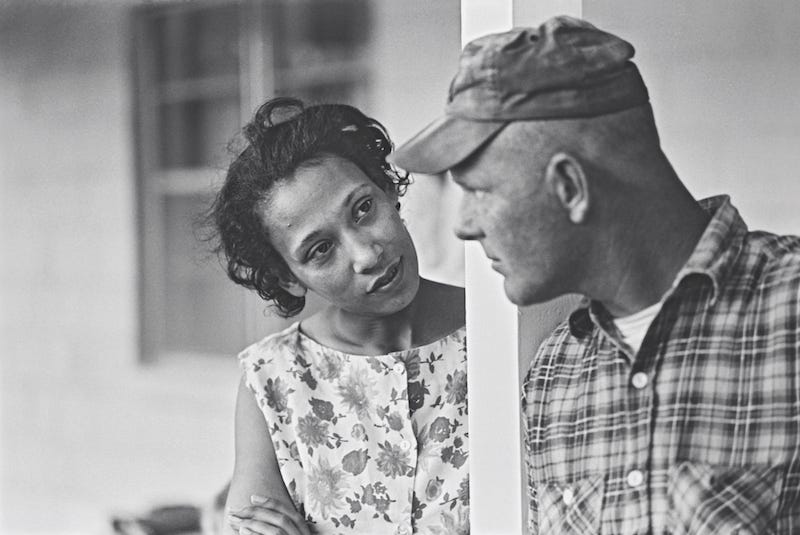One of my apartments in NY was on a south-facing corner of Amsterdam; the only north-bound, three-lane thoroughfare on the Upper West Side. As such, a wall of sound, everything from fire engines and sirens to honking cabs and rumbling 18-wheelers, blasted the building 24/7. But that’s just NYC, so, like everyone else, I acclimated. Eventually, it got to where I didn’t even notice it; that is, until it was gone. A year later, I’d moved to one of the nearby side streets, one quiet enough to hear birds singing. It was there, as my breathing leveled out and my shoulders dropped, that I realized I’d been suffering from noise fatigue.
I thought back to that apartment while watching 14 Love Letters, which might be the sappiest movie Hallmark has ever made, and that’s saying something. I'm not much for rom-coms, but I was intrigued by the protagonists; an African American heroine and a Euro American love interest, which instantly reminded me of Mildred and Richard Loving. That would turn out to be only a slice of the diversity on display. The female lead, a horseback-riding, pickup truck-driving, mystery novel reader, was a farm girl who grew up on land her family had owned and worked for five generations.
She had her own personal care products line based on goat’s milk recipes passed down by her grandmother. Her best friend, a Latina, was in an interracial marriage, and both her mother and her mother's friend, who happened to be of Indian ancestry, had been trying to match-make their children since they were in grade school.
Both kids had recently returned home; her, to take over the farm, and him, to teach chemistry at their old high school. The Euro American love interest, a horse trainer who’d purchased their old house, was both orphaned and grieving the death of his sister, who was paraplegic, and who had inspired his dream of opening a riding camp for kids with special needs. Then, there was the African American veterinarian who owned a sailboat (another stereotype challenged), the Asian American magazine editor, the Native American delivery guy, etc. You get the idea.
The heroine, seeking to solve the mystery of the love letters that kept showing up in her mailbox, ended up going on dates with both the vet and the chemistry teacher. But it’s clear early on that the real chemistry is with the cowboy. And yet, with all this diversity, unbelievably, there was not one single mention of race ideology. There was no pandering to stereotypes; no innuendo, no assumptions that random people whose grandparents hailed from the same continent are somehow the same. In fact, there was no othering of any kind.
As I watched, I was surprised by the sense of relief this film evoked within me; simply by all the things it hadn’t done. My breathing leveled out and my shoulders dropped. And my overriding thought was, "I want to live in that world." Like the quiet after my Amsterdam apartment, that small glimpse into life without the ARC’s (American Race Construct) oppressiveness made me aware of the toll the paradigm itself was taking. And in that moment, I realized I was suffering from race fatigue.
Still, there are some who see this, simply imagining a world with less racial noise, as a threat; that by denying race is real, we’re also claiming racism doesn’t exist, and therefore invalidating movements like Black Lives Matter. I believe the opposite is true. The very reason such movements, from Abolition to Suffrage to Pride, are needed is because our frameworks insist that some of us are inherently different and therefore don’t matter.
Others of us scoff at this “Hallmark” world, calling it “Pollyannaish” and declaring it unrealistic. But isn’t that exactly what dreams are for – to imagine what isn’t yet, but might yet be? The dream Martin so powerfully invoked wasn’t small. It wasn’t about replacing one version of the ARC with another. He dreamed of an America where ancestry has no bearing on destiny, where we all get to choose our identity, and where only we determine what that identity means. That's really all the Lovings wanted; a world where they could just be. They deserved that. And so do the rest of us.





It is surprising how much fatigue we endure in our daily lives without even realizing it. New York City dwellers seem to endure an outsized share of crowd fatigue, temperature/humidity fatigue, and noise fatigue. Those are all relatively easily remedied. Race fatigue, I believe, requires a considerable effort at inner peace to overcome. Perhaps love is the only reliable pathway to sustained relief?